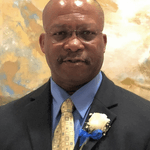
Death Penalty Information Center and Veteran Advocacy Project
Webinar Series on
Veterans and the Death Penalty
Faculty
November 9 – 19, 2020
Co-Sponsored by Advancing Real Change and Witness to Innocence

Kirk Bloodsworth
An honorably discharged Marine, Kirk Bloodsworth is the first person in the United States to be exonerated from death row based on DNA testing. In 1984, he was arrested for the rape and murder of nine-year-old Dawn Hamilton. He was sentenced to death in Baltimore County, Maryland in 1985.
In 1989, Kirk read about a new forensic breakthrough called DNA fingerprinting and in 1992 lobbied successfully for prosecutors’ approval for its use on evidence collected at the crime scene in 1985. The tests incontrovertibly established Kirk’s innocence, and he was released in June 1993 after nearly nine years in prison, two of which he spent on death row. In December 1994, Maryland Governor William Donald Schaefer granted Kirk a full pardon based on innocence. In 2003, the real killer was convicted and sentenced to life in prison.
Kirk currently lives in Philadelphia and is the Executive Director of Witness to Innocence.
Since his exoneration, Kirk has devoted himself to abolishing the death penalty and addressing wrongful convictions. He has testified before the United States Congress as well as numerous state legislatures, has authored numerous op-eds, and given countless other media interviews. In 2004, Congress passed the Innocence Protection Act, which established the Kirk Bloodsworth Post-Conviction DNA Testing Program to help states defray the costs of testing DNA evidence after conviction. Today, the Act provides $10 million per year in federal grants for DNA testing.
Kirk has been a member of Witness to Innocence since its inception. After teaching himself the art of silversmithing, Kirk created signature “exoneree” and “death row exoneree” 28g sterling silver rings, which he has gifted to 235 exonerees to date.

CAPT Art Cody, USN (Ret.)
Captain Art Cody, U.S. Navy (Retired) is the Director of Criminal Programs at the Veteran Advocacy Project. His military career spans more than thirty years and he has served worldwide. Art began his career as an Army helicopter pilot followed by a similar role in the Navy Reserve flying for a Strike Rescue/Special Operations Squadron. He served aboard USS Enterprise (CVN-65) in the initial response to the 9 – 11 attacks and was most recently deployed to Afghanistan (2011 – 2012) as the Staff Director of the Rule of Law Section, U.S. Embassy Kabul.
As a civilian lawyer, Art has represented capital clients for more than twenty years. He is a former chair of the Capital Punishment Committee of the New York City Bar Association, and currently co-chair of the New York State Bar Association’s Veterans Committee. He frequently presents nationally on the defense of veterans, provides counsel to lawyers for capitally charged or sentenced veterans, and served as lead counsel in a veteran capital clemency hearing. Most recently (January 2020), he assisted Advancing Real Change and the Southern Center for Human Rights in obtaining clemency for Jimmy Meders, an Army veteran.
In addition to an Aerospace Engineering degree from West Point, Art graduated magna cum laude from Notre Dame Law School where he was the Executive Editor of the Notre Dame Law Review and founded the Notre Dame Coalition to Abolish the Death Penalty. He is a recipient of the New York City Bar Association’s Thurgood Marshall Award for Capital Representation, the Four Chaplains Legion of Honor Humanitarian Award for Lifetime Service, and the New York State Bar Association’s 2019 David S. Michaels Award for his representation of veterans in Criminal Courts. His military decorations include the Navy Bronze Star Medal, Meritorious Service Medal, Naval Aviator Badge, Army Aviator Badge, Army Parachutist Badge and the German Armed Forces Parachutist Badge. Additionally, he received the State Department’s Meritorious Honor Award for his service in Kabul.

Richard C. Dieter
Richard Dieter served as Executive Director of the Death Penalty Information Center in Washington, D.C. from 1992 until 2015. He is the author of 40 reports on the death penalty that have been widely cited in the national media and utilized at all levels of state and national government, including the U.S. Supreme Court. His 2015 DPIC report, Battle Scars: Veterans and the Death Penalty, received the Congressional Black Caucus’s Veterans Braintrust Award.
Dick has been a frequent guest on national television and radio news programs and has been widely quoted in the nation’s newspapers. He is currently the Principal Consultant at RDieter Communications.
Dick served as an Adjunct Professor at the Catholic University School of Law for 14 years. He was a founder of the Pre-Trial Release Program at the Community for Creative Non-violence in Washington and the co-founder of the Alderson Hospitality House for visitors to the country’s main federal women’s prison in West Virginia. He currently serves as Treasurer of the Board of Directors for Witness to Innocence, and as a Board Member of the Capital Punishment Research Initiative and the Catholic Mobilizing Network. Dick received the Frederick Douglass Human Rights Award from the Southern Center for Human Rights in 2016.
Dick received his law degree from the Georgetown University Law Center, where he was named a Public Interest Law Scholar.

Robert Dunham
Robert Dunham is Executive Director of the Death Penalty Information Center and a nationally recognized expert on the death penalty. Before joining DPIC in March 2015, he was one of the leading capital appeal lawyers in Pennsylvania, arguing on behalf of the Commonwealth’s death-row prisoners in its state and federal courts and in the United States Supreme Court.
Rob served as Executive Director of the former Pennsylvania Capital Case Resource Center from 1994 to 1999; Director of Training of the Capital Habeas Unit of the Philadelphia federal defender’s office from 1999 to 2009; and as an assistant federal defender in the Harrisburg federal defender’s capital habeas unit from 2009 until he joined DPIC. Collectively the offices overturned more than 150 unconstitutionally imposed death sentences, against just three executions — all of mentally ill prisoners who waived their appeals. Rob started his legal career as a litigation associate at Schnader, Harrison, Segal & Lewis in Philadelphia, where he handled his first pro bono capital case. He previously served five years as a legislative assistant to State Representative Robert W. O’Donnell, later the Speaker of the Pennsylvania House of Representatives.
Rob has taught in death penalty training programs across the country for more than twenty-five years. He was an adjunct professor of law at Villanova Law School for eleven years, teaching death penalty law, and has also taught death penalty at Temple Law School and as a visiting scholar at Oklahoma State University. Rob has served on the Steering Committee of the American Bar Association’s Death Penalty Representation Project and on the board of directors of the Pennsylvania Innocence Project and the Pennsylvania Association of Criminal Defense Lawyers. He is the recipient of the Outstanding Legal Service Award from the National Coalition to Abolish the Death Penalty; the Liberty Award for career achievement from the Pennsylvania Association of Criminal Defense Lawyers; and the Andrew Hamilton career public service award from the Public Interest Section of the Philadelphia Bar Association. A University Scholar in Philosophy at the University of Pennsylvania, Rob received his law degree from the Georgetown University Law Center, where he was managing editor of the Georgetown Law Journal.

Dr. Jerid Fisher
Jerid M. Fisher, Ph.D. is a Board Certified Forensic Neuropsychologist with more than 30 years’ experience. He earned his Bachelor’s degree in Psychology from Duke University and his Ph.D. in Clinical Psychology from the University of Rochester. After working at the University of Rochester Medical Center (URMC) as a Senior Instructor in Psychiatry and Neurology and the Director of the Cognitive Functions Laboratory, Fisher left academia to develop brain injury rehabilitation programs across New York State. Fisher has specialized in high profile litigation as a criminal expert for both the prosecution and defense as well as working as a plaintiff and defense expert in civil litigation matters.
In Fisher’s former role as the Chairman of the National Academy of Neuropsychology Foundation (2016 – 2017), he was particularly interested in educating the children of our Wounded Warriors, editing the book“My Dad Got Hurt. What Can I Do?”, which was given away to military families. The book was later awarded the Silver Seal by the Military Writers Society of America. Fisher is a fellow of the American College of Professional Neuropsychology, Clinical Associate Professor of Psychiatry at the URMC, and Adjunct Assistant Professor of Clinical Psychology at SUNY Albany. He has published multiple peer-reviewed articles, book chapters, and books, including the true crime story, Upside Down: Madness, Murder, and the Perfect Marriage.

Brock Hunter
Brock Hunter is a criminal defense attorney who handles all types of criminal cases in the state and federal courts. Brock has served as the President and Legislative Chair for the Minnesota Association of Criminal Defense Lawyers (MACDL) and received its Special Achievement Award in 2009.
Brock is also a former U.S. Army recon scout who focuses his practice on defending psychologically injured veterans in the criminal courts and advocating for reforms in the way the justice system deals with them. Brock helped draft and lead passage of Minnesota’s Veterans Sentencing Mitigation Act, Minn. Stat. 609.115, subd. 10., which was subsequently cited in the landmark U.S. Supreme Court case, Porter v. McCollum, 130 S. Ct. 447, at 455, n.9 (2009), the Court’s first to address combat trauma in criminal sentencing.
Brock has since helped pass similar veteran sentencing legislation in other states, has been called on to brief the Obama and Trump Administrations, and has spoken to leadership of the Department of Defense, and the Department of Veterans Affairs on more effective ways to address troubled veterans who commit crimes. Brock has also trained thousands of attorneys, judges, law enforcement officers, and mental health professionals across the country on these same issues.
Brock is the lead editor and co-author of the book, The Attorney’s Guide to Defending Veterans in Criminal Court. He is also the co-founder and President of the Veterans Defense Project (VDP) – a non-profit dedicated to advocating and educating for veterans in the justice system (more information on the Defending Veterans book and the VDP available at http://veteransdefenseproject.org/.)

Gilbert King
Gilbert King is the author of three books, most recently, Beneath a Ruthless Sun. His previous book, Devil in the Grove, was awarded the Pulitzer Prize for general nonfiction in 2013. A New York Times bestseller, the book was also named runner-up for the Dayton Literary Peace Prize for nonfiction, and was a finalist for both the Chautauqua Prize and the Edgar Award.
Devil in the Grove details the case of the Groveland Four, who were falsely accused of the rape of a white woman in Groveland, Florida. African American army veterans Samuel Shepherd and Walter Irvin were wrongly convicted and sentenced to death in the case, 16-year-old Charles Greenlee was sentenced to life, and Ernest Thomas was shot to death by a lynch mob led by Lake County sheriff Willis V. McCall. After Thurgood Marshall and the NAACP Legal Defense Fund became involved in the case, the U.S. Supreme Court overturned Shepherd’s and Irvin’s death sentences. McCall later shot Shepherd and Irvin, claiming they had tried to escape. Shepherd was murdered, but Irvin played dead and survived the shooting. Irvin was again tried and sentenced to death, receiving a last-minute reprieve from execution before his sentence was ultimately commuted by the governor.
King has written about race, civil rights, and the death penalty for the New York Times, the Washington Post, and The Atlantic, and he is a contributor to The Marshall Project, a nonprofit news organization covering the U.S. criminal justice system. King’s earlier book, The Execution of Willie Francis, was published in 2008. He lives in Brooklyn, N.Y.

Ray Krone
Ray Krone co-founded Witness to Innocence with Sister Helen Prejean in 2003. Before his exoneration in 2002, Ray spent more than 10 years in Arizona prisons, including nearly three years on death row, for a murder he did not commit.
Honorably discharged from the U.S. Air Force and working for the U.S. Postal Service, Ray’s world was turned upside down in 1991, when Kim Ancona was murdered in a Phoenix bar at which Ray was an occasional customer. The case against him was based largely on circumstantial evidence and the later discredited junk-science testimony of a prosecution “expert” who claimed bite marks found on the victim matched Ray’s teeth. He was sentenced to death in 1992. In 2002, with the help of attorney Alan Simpson and DNA implicating a recently released sex offender who was living in the vicinity of the bar, he convinced an appeals court to overturn his conviction. When prosecutors dropped the charges that April, Ray became the 100th person exonerated from death row since the reinstatement of capital punishment in the United States in 1976.
Ray continues to be an active member of Witness to Innocence, speaking across the nation and urging states to abolish the death penalty. He now lives with his partner Cheryl Naill in Tennessee and devotes his life to improving the criminal justice system that failed him. “I would not trust the state to execute a person for committing a crime against another person,” he says. “I know how the system works. It’s not about justice or fairness or equality. Any chance I can, whether I start with one or two people or a whole auditorium filled with people, I’ll tell them what happened to me. Because if it happened to me, it can happen to anyone.”

Ngozi Ndulue
Ngozi Ndulue is Senior Director of Research and Special Projects at the Death Penalty Information Center. Ngozi’s career as a lawyer has focused on the intersection of racial justice and the criminal legal system. After graduating from Yale Law School, she clerked for Judge Eric L. Clay on the U.S. Court of Appeals for the Sixth Circuit. She litigated on behalf of death-sentenced individuals as an Assistant Federal Public Defender in Phoenix, Arizona and as a staff member of the Ohio Justice and Policy Center (OJPC) in Cincinnati, Ohio. At OJPC, Ngozi also engaged in policy research, coalition building, and advocacy on a variety of state and local criminal justice issues.
Before coming to DPIC in September 2018. Ngozi served as Senior Director of Criminal Justice Programs at the national NAACP, where much of her work centered on providing unit training, strategic direction, and research to support the NAACP’s criminal justice agenda.
Ngozi is the principle author of DPIC’s landmark September 2020 report, Enduring Injustice: The Persistence of Racial Discrimination in the U.S. Death Penalty.

Teresa Norris
Teresa is Special Assistant Public Defender in the Ninth Judicial Circuit of South Carolina, primarily assigned to aggravated murder trial cases in both Charleston and Berkeley Counties. She has represented approximately 45 – 50 capital defendants throughout all stages of their cases, from pretrial proceedings through clemency and has served as a consultant, both pro bono and retained, in numerous other death penalty cases. Most of her work has been in South Carolina, but she has also represented death-sentenced prisoners in Mississippi, North Carolina, Texas, Virginia, the military, and the federal system.
Teresa served as Director of the Center for Capital Litigation, a private non-profit devoted to capital defense, in Columbia, South Carolina from 1994 – 2006, after four years as an Army Officer in the United States Army Legal Services Agency, Defense Appellate Division in Falls Church, Virginia. From April 2006 until she joined the Public Defender office in November 2016, she was in private practice in Columbia, South Carolina, primarily doing capital defense work.

Lt. Col. Jonathan Potter (Ret.)
Jonathan Potter is currently the Senior Appellate Capital Counsel in the United States Army Defense Appellate Division (DAD). He has been representing soldiers on appeal since 1999, including the last four sentenced to death. He has also served as an Assistant United States Attorney in the Criminal Section, Northern District of Indiana; a Trial Attorney in the Office of Immigration Litigation at the Department of Justice, and a Trial Attorney in the Attorney General’s Office for the District of Columbia, Equity Section. During his military career, in addition to working at DAD, he served as the Chief of Military Justice, 101st Airborne Division (Air Assault); Lead Litigation Attorney, Environmental Law Division-Rocky Mountain Arsenal; and Appellate Counsel, Government Appellate Division.
He has an L.L.M. in Environmental Law from George Washington University; an L.L.M. in Military Law from The Judge Advocates General’s School, United States Army; a J.D. from Valparaiso University School of Law; and is a graduate of the United States Army’s Command and General Staff College. Lt. Col. Potter retired from Active Duty in the Army in 2016.

Dr. Victoria Reynolds
Victoria Reynolds. Ph.D. is a clinical psychologist who specializes in the assessment and treatment of the impact of traumatic life experiences, including childhood sexual abuse, physical abuse and neglect, adult rape, domestic violence, military sexual trauma, and exposure to combat. She is a nationally known forensic trauma consultant on capital and other murder cases, where she provides expert assessment and testimony on the effects of childhood maltreatment, domestic violence, and adult trauma exposure on development and behavior.
Dr. Reynolds worked for Department of Veteran Affairs Medical Center in Durham, North Carolina until 2012, where she was the lead psychologist in the Women’s Comprehensive Health Center and the Male Military Sexual Trauma Program. In this capacity, she treated male and female veterans who had experienced childhood trauma as well as exposure to combat and sexual assault during their military service. She taught and trained staff, residents and post-doctoral fellows in the assessment and diagnosis of trauma-related disorders such a PTSD and complex PTSD and in evidence-based treatment models for trauma-related diagnoses. Before working for the VA System, she did her post-doctoral fellowship and held a staff position at the Duke University’s Center for Child and Family Health, a forensic trauma and treatment center for children and families.
She has given invited lectures, nationally, on the developmental impacts of childhood and adult trauma, and has provided consultation across the country within the VA system on the particular effects of sexual abuse on males. She has been an active member of the International Society For Traumatic Stress Studies for more than 20 years, where she has presented papers and chaired symposia on the effects of traumatic experiences on children’s development and subsequent adult behavior.
Dr. Reynolds graduated magna cum laude from Brown University and received her Ph.D. from Duke University.

Judge Robert Russell
Judge Robert Russell is an Associate Judge for Buffalo City Court and serves by appointment as an Acting Erie County Court Judge. In January 2008, he created and began presiding over this Country’s first “Veterans’ Treatment Court.” The National Vietnam Veterans of America has awarded Russell with the Vietnam Veterans of America Achievement Medal and The National Veterans of Foreign Wars of the United States has awarded Russell with the James E. Dan Zandt Citizenship Award. Russell is also the recipient of the 2014 White House Advocates for Action Award, presented by the White House Office of National Drug Control Policy (ONDCP) and the 2015 AMVETS- American Veterans (National) Silver Helmet Award.
Russell created and presides over Buffalo’s Drug Treatment Court since December 1995. His work in the treatment court field led to his induction into the National Association of Drug Court Professionals’ Hall of Fame. He is also the recipient of the New York State Association of Drug Treatment Court Professionals’ Leadership Award. In addition, he established and began presiding over Buffalo’s Mental Health Treatment Court. The National Alliance for the Mentally Ill (NAMI), an advocacy organization for the mentally ill, has awarded Russell with the Nancy D. Smith Memoriam Award.
Russell is the Past Chairman of the Board of Directors of the National Association of Drug Court Professionals, Inc., and the Past President of the New York State Association of Drug Treatment Court Professionals, Inc. He also served on the National Advisory Board of the Judges’ Criminal Justice/Mental Health Leadership Initiative (JLI). The JLI is co-coordinated by the Council of State Governments’ (CSG) and The National Gains Center. He is the recipient of several Awards of Merit from the American Bar Association, New York State Bar Association, and the Erie County Bar Association. Community Awards include the Buffalo News 2009 Outstanding Citizen Award and the Leadership Buffalo 2010 Openness to Change Award. Russell is a graduate of Howard University Law School in Washington, DC

Col. Dwight H. Sullivan, USMC
Dwight Sullivan is the Senior Associate Deputy General Counsel for Military Justice and Personnel Policy in the Department of Defense Office of General Counsel. He is a retired colonel in the United States Marine Corps Reserve. His previous positions include chief defense counsel of the military commission system, senior litigation counsel and acting chief of the Air Force Appellate Defense Division, and managing attorney of the American Civil Liberties of Maryland’s Baltimore office. He spent the first 10 years of his legal career as an active duty Marine Corps judge advocate.
Dwight is an elected member of the American Law Institute, the co-author of a military justice casebook, and the author of numerous law review articles on military and Maryland law. He holds a J.D. from the University of Virginia School of Law, a B.A. and M.A. from the University of Maryland College Park, and an LL.M. from The Judge Advocate General’s School, U.S. Army. He lives in Arnold, Maryland, with his wife (Lynne), daughter (Shannon), and dogs (Liberty and Sailor).

Jennifer Taylor
Jennifer Taylor, Senior Attorney at the Equal Justice Initiative, has been living and working in Montgomery, Alabama since her 2010 graduation from Yale Law School. At EJI, Jennifer has represented incarcerated men and women challenging their convictions, sentences, and inhumane conditions of confinement — including men and women on death row, and clients sentenced to life without parole as children. Jennifer also researches, writes, and speaks as part of EJI’s public education project linking mass incarceration and American racial history; and contributes content and design to exhibits for The Legacy Museum: From Enslavement to Mass Incarceration and The National Memorial for Peace and Justice.
Jennifer has a B.A. in Comparative Studies in Race and Ethnicity from Stanford University and a Master’s in Journalism from Columbia University. She was editor and a contributing author of EJI’s 2019 report, Targeting Black Veterans: Lynching in America.

Edward J. Ungvarsky
Ed Ungvarsky is Principal with Ungvarsky Law, PLLC in Alexandria, Virginia, where he provides criminal and capital defense representation and complex civil case representation in Washington, DC, Northern Virginia, and in the federal courts within the District of Columbia, Maryland, Virginia, and West Virginia. Prior to opening his own private practice, Ed served as a public defender and capital defender in Washington, D.C. and Northern Virginia.
Ed and his teams have successfully avoided the death penalty for all of their capital clients. In 2018, Ed’s team obtained a life sentence after a jury trial for a U.S. Army Staff Sergeant tried for the murders of his wife and a responding police officer in Prince William County, Virginia — the first time the local prosecutor had failed to obtain a death sentence in 50 years in office.
Ed frequently lectures on issues related to the death penalty, trial advocacy, forensic science evidence and expert testimony, and ethics and professionalism. He serves on the faculties of Harvard Law School’s Trial Advocacy Workshop, the National College of Capital Voir Dire, and provides training at other law schools and national legal education programs. Ed received his B.A. from Wesleyan University and his J.D. from Yale Law School. After law school, Ed clerked in Montgomery, Alabama for the Honorable Frank M. Johnson, Jr., on the U.S. Court of Appeals for the Eleventh Circuit. Ed received the 2014 NLADA Kutak-Dodds Award for his extraordinary work for justice over his career, the 2017 – 18 Bill Geimer Award from the Virginia Capital Case Clearinghouse, and has been listed as a top criminal defense in the DC/VA area by The Washingtonian and Northern Virginia Magazine.

Ralph “Ron” Wright
Ralph “Ron” Wright Jr. was an Air Force Sergeant and Orange County Deputy Sheriff who spent three years on Florida’s death row, wrongfully incarcerated for the murder of his former girlfriend and her young son in 2007.
No forensic evidence, weapon, cell records, or any eyewitness testimony incriminated Ron. The prosecution’s key piece of evidence was a black glove of the same kind issued to Ron’s military unit; however, analysts were uncertain if it came from Ron’s military base. DNA tests on the glove run by the Florida Department of Law Enforcement showed no definitive match for Ron, and independent analyses by labs hired by both the defense and prosecution excluded Ron. In August 2014, he was convicted solely on the basis of potential motive and opportunity; a jury voted 7 – 5 to recommend the death penalty. The Florida Supreme Court unanimously overturned Ron’s conviction and entered a judgment of acquittal in May 2017, finding that the evidence against him was “purely circumstantial” and insufficient to convict Ron on any charges. He became the 27th person since 1973 to be exonerated from Florida’s death row.
In October 2016, while Ron’s case was on appeal, the Florida Supreme Court declared death sentences based upon non-unanimous jury recommendations to be unconstitutional. Then, in January 2020, the court reversed course and said they were constitutionally permissible. In the interim, the Florida legislature repealed the portion of the state’s death-penalty statute that allowed judges to impose death sentences based on non-unanimous jury recommendations.
Ron now lives in Florida, where along with many other Florida exonerees, he fights for death penalty abolition.

Dr. Stephen N. Xenakis, Brigadier General (Ret.), U.S. Army
Dr. Xenakis is an adult, child, and adolescent psychiatrist with many years of clinical, academic, and management experience. He retired from the U.S. Army in 1998 at the rank of brigadier general and entered an active career in start-up medical technologies and clinical practice. He has advised the Chairman of the Joint Chiefs of Staff and other senior Department of Defense officials on psychological health, the effects of blast concussion, and suicide. During his career in the Army, he pioneered the introduction of telemedicine applications including the development of a device for electronic house-call services. He has an active clinical and research interest in promising medical technology, including quantitative electroencephalography (qEEG). He founded of the Center for Translational Medicine to develop treatments and conducts tests on brain-related conditions affecting soldiers and veterans.
Dr. Xenakis has numerous medical publications and is an Adjunct Professor at the Uniformed Services of Health Sciences of the military medical department and on the Executive Board of the Center for Ethics and Rule of Law at the University of Pennsylvania Law School. He is a graduate of Princeton University and the University of Maryland School of Medicine.